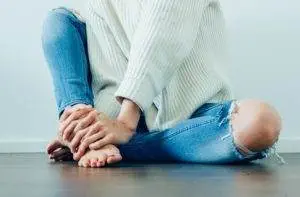By Xiaomei Cai, L.Ac,. Ph.D. & Qineng Tan, L.Ac., Ph.D.

Do you feel constantly gassy or have a bloated stomach after eating? Digestive problems like gastritis or colitis can cause abdominal bloat. Stress and hormonal imbalances can also contribute to inflammation and bloated stomach pain. Acupuncture and TCM herbs can help improve digestion and relieve abdominal bloating.
Abdominal bloating occurs when gas builds up in the gastrointestinal tract, filling the stomach and/or intestines with air. This can cause the belly area to get swollen and distended. Bloating can cause an inflated belly, sharp pain in the abdomen, belching and flatulence, nausea, or a sudden strong urge to go to the bathroom. Bloating can be related to fluid retention; this is sometimes called “water bloat.”
Problems with digestion that lead to a feeling of heaviness, “like a rock” in your belly after eating, are common. People who have been diagnosed with some type of functional gastro-intestinal disorder (FGID)–like irritable bowel syndrome (IBS) or dyspepsia (indigestion)–are extremely likely to experience abdominal pain and bloating after eating, while up to 30% of all people report having bloating at least some of the time. Inflammation in the walls of the stomach (gastritis) or intestine (ulcerative colitis) can also cause bloating.
Women often feel bloated before or during their menstrual period, and female reproductive disorders like endometriosis, fibroids (leiomyoma of the uterus), and PCOS (polycystic ovarian syndrome) can cause abdominal pain and bloating.
FGIDs can be very hard to manage; it may be difficult to get a clear diagnosis or effective medical treatment. Problems like constipation, diarrhea, nausea, abdominal pain and bloating are highly subjective, and people are often made to feel like it’s normal to have these issues, or that all they need to do is avoid certain foods.
Feelings of anxiety and depression are common among people who suffer from moderate to severe bloating on a regular basis. This can become a vicious cycle, as the pain and swelling of the abdomen causes anxiety, and the physiological effects of the emotional stress trigger the bloating to happen again and again. Sometimes people dread eating meals because they are so afraid of the painful and embarrassing bloated stomach.
Digestive upsets are complex to treat because there can be many factors contributing to the discomfort. So many different conditions can cause bloating, it can be hard to get a clear handle on the true cause. This is a case when TCM methods of diagnosis offer many advantages, because a TCM practitioner will be able to study the whole picture presented by a patient and pinpoint what underlying conditions are causing gas and distension. Acupuncture and herbs can help resolve abdominal bloating and other symptoms at their root source.
Top 10 Abdominal Bloating Causes

Why might someone feel bloated and gassy all the time? Many different types of gastrointestinal disorders can contribute to a bloated belly and excess gas, as can hormonal and emotional changes. What causes abdominal bloating can be one issue or a combination of factors:
- Irritable Bowel Syndrome (IBS)
- Inflammatory bowel disease, Ulcerative colitis or Crohn’s Disease
- Gastritis, stomach ulcers, inflammation of the stomach
- Food intolerance, gluten intolerance, celiac disease
- PMS, menstruation
- Stress, anxiety, depression
- Pregnancy
- Constipation
- Liver disease
- Abdominal adhesions, or scar tissue from surgeries
Eating behaviors like eating too quickly, swallowing air while eating, or eating fiber-rich foods that cause gas like beans, can lead to bloating. Drinking a lot of carbonated beverages can lead to excess gas in the GI tract. Smoking can also be a factor. Some medications can cause bloating as a side effect, including antibiotics, oral birth control pills, opioid pain medications, medicines to relieve constipation, and even some supplements, like iron pills.
Cancers of the abdominal organs, such as ovarian cancer, stomach cancer, colon cancer, or pancreatic cancer, can also cause bloating in the belly. Gallstones or gallbladder disease, gastroparesis, kidney problems, and liver problems can all cause stomach pain and bloating.
Medical Treatment for Abdominal Bloating
Many people do not seek medical help for bloating, trying to manage it on their own with over the counter medications that promise relief from gas pain and acid reflux. Antacids only help with the kind of bloating that is caused by food, though; they don’t help with bloating related to FGIDs, hormones, or emotional stress. When a person does ask their primary care doctor or even a gastroenterologist for help with bloating, they may find that the treatment options are very limited. Doctors will usually reassure patients that gas and bloating, while uncomfortable, are not actually dangerous. Then, they will often advise that patients go on a strict elimination diet, cutting out wheat, dairy, and most vegetables and legumes. Sometimes doctors will prescribe antibiotics to alter the balance of gut bacteria. Antidepressants are sometimes prescribed to help with bloating. Conventional medical science still has a ways to go to fully understand the underlying causes of digestive problems like bloating.
Because bloating is not viewed as a disorder in and of itself, not much serious research has been done to show what types of treatments work best to get rid of bloating. TCM treatment has been shown in a randomized controlled trial, a peer-reviewed study, and a hospital-based investigation to help in relieving stomach pain due to chronic gastritis.
How Can Acupuncture Help With Bloating?
TCM offers a multidisciplinary approach to the digestive problems, hormone imbalances, and emotional upsets that can cause bloating. An experienced acupuncturist is able to use methods of diagnosis such as studying the appearance of the tongue, feeling the pulse, and asking lots of questions about how and when the symptoms occur to find the specific pattern of imbalance that is causing gastric distress.
Different presentations of digestive conditions that may cause abdominal bloating and pain include:
- Spleen/Stomach Deficiency – characterized by symptoms: chronic bloating, poor appetite, feel worse after eating, pallor, and fatigue. This type of bloating can be caused by antibiotics, too much raw or fermented food, eating disorders, a long period of illness, or chronic inflammatory disorders.
- Damp-Phlegm – symptoms include: distended stomach, nausea, acid reflux, diarrhea. This type of bloating can be caused by dietary habits that include excess sugar, alcohol, fatty or fried foods, and dairy products. Can also be related to damp environmental conditions.
- Liver Qi stagnation – common symptoms are: stomachaches, stomach gurgling, belching, and constipation. This type of bloating can be caused by stress, feelings of anxiety or anger, and irregular, emotional eating behaviors.
TCM treatment for abdominal bloating will use acupuncture and herbs to bring the stomach and liver back into harmonious function, clearing phlegm and improving digestion. Treatment will be individualized based on the underlying causes of the imbalance; if reproductive hormones are involved, then that factor will be taken into consideration when preparing the herbal formula. If mental health issues are a factor, specific points will be added to help relieve anxiety. Naturally, your acupuncturist will have some clear instructions on how to optimize your nutrition to reduce bloating.
Top 5 Tips for How to Stop Bloating

While bloating may be caused by all sorts of different factors, there is no doubt that making some changes to your eating habits will probably have an impact on how bloated you feel. What helps bloating may be different for each person’s constitution or lifestyle, so it will be very helpful to have an in-depth conversation with your acupuncture provider about what bloating diet is best for you.
- Chew your food thoroughly. Many people eat fast, and don’t pay much attention to chewing their food well before they swallow. Food is really meant to be broken down and mixed with saliva in the mouth before it moves down the esophagus and into the stomach. Skipping this important step by swallowing half-chewed food means that your stomach has to produce more acid and work much harder to digest the food before it moves deeper into your gastrointestinal tract. Eating too quickly can also easily lead to eating more than you need. It takes about 20 minutes for your brain to receive the message that the stomach is full. Chew slowly, and enjoy every bite; this will improve your digestion.
- Avoid icy cold drinks and foods. Cold liquids are shocking and unfriendly to your internal organs, both those of the digestive tract and the female reproductive organs. Constantly drinking ice-cold beverages irritates the smooth muscle tissues of the stomach, intestines, and uterus. Drink more warm liquids, which are soothing to these organs.
- Ginger tea – many of our herbal formulations include slices of fresh ginger to help soothe the stomach and GI tract. Ginger helps the body to produce more of the digestive enzymes that work to break down food, and relieves cramping in the belly. All you need to do is keep a knob of fresh ginger on hand, cut two or three slices and steep in hot water as you would a teabag. Sip anytime, but especially before meals, to help relieve gastritis pain and bloating.
- Choose foods in harmony with the season. Raw foods are appropriate in the summer, but in the winter, it’s better to eat cooked foods. Eating more bitter-tasting foods, like dark leafy greens, helps the liver and kidneys.
- Use acupressure to help relieve bloating and gassiness. Acupoints are located along the meridians and correspond to various organ systems. Applying gentle, steady, downward pressure to acupoint ST36 (Zu San Li), which is associated with the stomach, can help to relieve bloating, stomach pain, nausea, and feelings of stress. ST36 is located on the outer edge of the shin bone, about 4 finger widths beneath the kneecap.
Acupuncture Near Me for Abdominal Bloating
TCM offers a holistic approach to digestive problems of all kinds. Symptoms like abdominal bloating, stomach pain, and gassiness are usually signs that there is a deeper problem. If you haven’t been able to solve the problem of bloating with conventional medicine or dietary changes, you may be able to get help for digestive difficulties with acupuncture and herbs.
*This article is for education from the perspective of Traditional Chinese Medicine only. The education provided by this article is not approved by FDA to diagnose, prevent, treat and cure human diseases. It should not stop you from consulting with your physician for your medical conditions. Traditional Chinese Medicine is based on Qi, which is an invisible force that usually cannot be observed by modern science. Because science focuses on testing ideas about the natural world with evidence obtained through observation, these aspects of acupuncture can’t be studied by science. Therefore acupuncture and Chinese herbs are often not supported by double-blind, randomized trials, and they are considered alternative medicine therapies in the United States.
